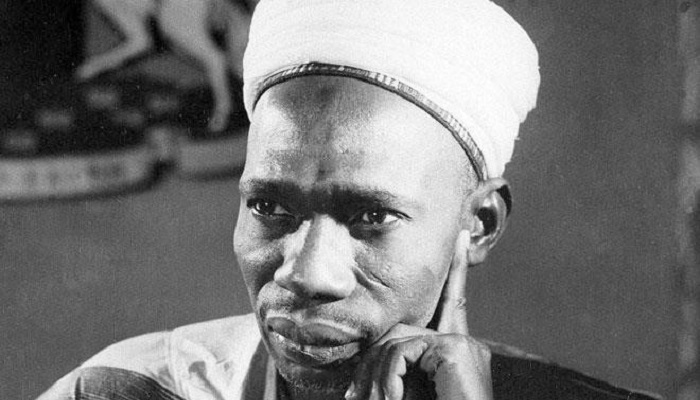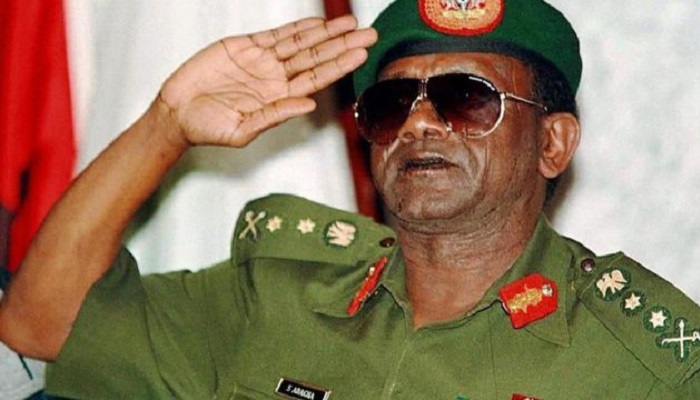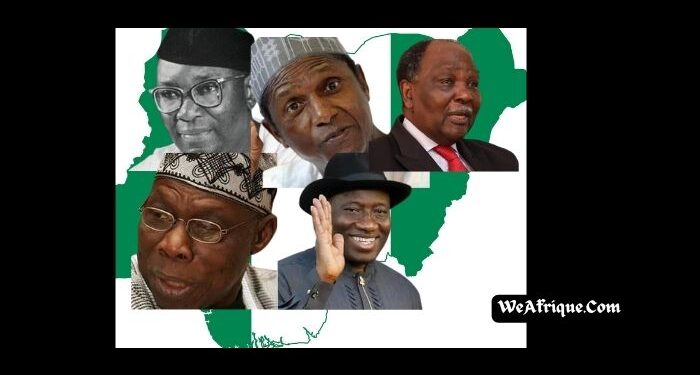Since Nigeria’s independence on October 1, 1960, it has been led by 15 leaders made up of military heads and democratically elected leaders. While some of these leaders came through elections, many more assumed office after coups. In light of this, their exit took a similar pattern with only a few like Sani Abacha and Umaru Musa Yar’Adua dying in office.
Notably, former leaders like Olusegun Obasanjo and Muhammadu Buhari led the country as military men and later as civilians. Sir Abubakar Tafabalewa, Nnamdi Azikiwe, Yakubu Gowon, and Goodluck Ebele Jonathan are some of the celebrated of these former leaders.
Let’s Find Out How Every Nigerian Leader Came to Power and How They Left
1. Sir Abubakar Tafawa Balewa(1960-66)

- Assumed Office: Elected
- Left Office: January 15, 1966-Through Military Coup
He was born in modern-day Bauchi state, northern Nigeria. Having enjoyed a Western education that saw him through the tertiary levels, he became one of the main supporters of education in Northern Nigeria.
Apart from this, Balewa was one of the earliest politicians to make demands for the independence of Nigeria from the British. Considering his huge contributions, it is unsurprising that he became Nigeria’s first prime minister in 1957. After his first term he ran for another in 1964 In fact, he ran for a second term in 1964 which he won.
However, his reign was cut short by a military coup At independence, he was made prime minister while Queen Elizabeth remained the head of government. He was re-elected for a second term in 1964. Despite his plans for the new country, he was removed from power through a bloody coup that claimed his life on January 15, 1966.
2. Nnamdi Azikiwe(1963-66)
- Assumed Office: Elected 1963
- Left Office: Through Coup in 1966
Fondly referred to as ‘Zik’, he was born in Zungeru in 1904 to parents from the Eastern part of the country. Before assuming office, Azikiwe worked as a Newspaperman, and through this, he spread his ideas of Garvey and the course of Nigeria’s independence.
His political career took off with his election into the Lagos Legislative Council. From there, he rose through the ranks to the position of governor-general in 1960. His primary role was representative of the British monarch. After the country changed its style of government to the republican system, he became Nigeria’s first president in 1963.
Though he had dreams of seeing Nigeria rise to assume its position of greatness, his stay in office was cut short by a military coup in 1963. His survival from this takeover of power makes him one of the leaders to escape death as a result of coups.
In later years he bid for the presidency in 1979 and 1983 but he was not successful. Sadly, the first Nigerian president died on May 11, 1996, at the age of 91 from an undisclosed ailment.
3. General Johnson Aguiyi-Ironsi(January 17, 1966-July 1966)
- Assumed Office: Through Military Coup
- Left Office: Was Killed in Military Coup
Also nicknamed Ironside, General Johnson Aguiyi Ironsi was born in Abia state to parents of Igbo descent and later became Nigeria’s first military head of state. He came to power through a coup organized by some Igbo army officers on January 16, 1966. Considering that the coup removed power and led to the death of Sir Tafawa Balewa, many felt that it was a planned attempt by the Igbos to take over power. The coup which happens to be the first in the nation’s history set a precedence for other coups.
His stay in office lasted less than seven months during which there was so much ethnic tension in the country. As abruptly as he assumed power, General Ironsi was also shown during a counter-coup by people of mostly northern origins in July 1966. Though he died during the coup, the events surrounding how he died have remained unexplained to this day. Ironside’s son, Thomas escaped death dressed as a girl while his father’s body was found in a nearby forest. Regardless of the sad death of the former head of state, the legend of his swagger stick also known as Charlie is still told. Many believe that his swagger stick deflected bullets during his command in the Congo War.
4. General Yakubu Gowon(1966-1975)
- Assumed Office: Through Military Coup
- Left Office: Through Military Coup
He is the youngest head of state that Nigeria ever had when he assumed office at the age of 31 in 1966. Gowon was born in Pankshin, Plateau state. He came to power through a military coup that ousted General Ironsi. In his rise to power, Gowon was faced with some of the greatest challenges that many nations prayed never to experience such as the civil war which started in 1967.
During the war, Gowon reorganized the country into twelve states. Aside from this, he was active in building a united Africa. It is not surprising that it was while he was on an OAU visit in Uganda that his government was overthrown in the military coup of July 29, 1975.
Over the years, many have argued about his role in the civil war. While some accuse him of causing the war, there are many who celebrate him as a unifier of the country. Regardless, his tenure left lasting legacies like the NYSC scheme aimed at fostering national unity among different groups.
5. General Murtala Muhammad(1975-1976)
- Assumed Office: Through Coup
- Left Office: Killed in a Coup
These days his name is part of many national monuments like the airport in Lagos and the names of major highways in the country. Like many military leaders, he came to power through a coup that toppled Gowon’s government.
In his inaugural speech and throughout his stay in office, he made it clear that everything would be done with immediate effect. This earned him the nickname of the man who ruled with ‘immediate effect’. As quickly as he wanted to rule the country, he did not live long to see things done immediately as he was killed just 7 months into his reign in a futile coup. Reportedly, he was killed on his way to work on Valentine’s Eve in 1978 in a coup led by Lt. Col. Buka Suka Dimka.
6. General Olusegun Obasanjo(1976-1979)
- Assumed Office: Succeeded Slain Leader, Murtala Muhammad
- Left Office: Handed Over to Civilian Government
General Obasanjo was born in Abeokuta and came to power after the unsuccessful coup that ousted Murtala. As Murtala’s deputy, General Obasanjo took over. Notably, he rose to be an effective military diplomat who promoted African unity and was at the forefront of fighting the apartheid regime in South Africa.
As you would easily find in the records, he followed through with Murtala’s plan of returning the country to civilian rule in 1979. He is still remembered as the first African military leader to hand over power to civilians.
7. Shehu Shagari(1979-1983)
- Assumed Office: Elected
- Left Office: Through Coup
He came to power 13 years after the military took over the reign of power. He had run for the number one political office in Nigeria under the National Party of Nigeria and won. Shagari was sworn in October 1979.
Shagari was in office for four years before he was ousted through a military coup. While Nigerians had plans for a new year, this was shattered by a change in government that occurred on December 31, 1983. This effectively ended Nigeria’s Second republic.
See Also: 12 Most Iconic And Greatest African Presidents Ever
8. Major General Muhammudu Buhari(December 31,1983- August 1985)
- Assumed Office: Through Coup
- Left Office: Through Coup
He assumed the office after ousting Shagari on New Year’s Eve in 1983. However, his stay in office was short-lived as he ruled for less than two years before he was also taken out through a peaceful coup. During his time in office, he introduced austerity measures as well as the War Against Indiscipline program to tackle corruption.
While these measures were laudable, people soon became dissatisfied with his government leading to another coup on August 27, 1985. Though he was not killed, he was detained at Benin City till 1988 when he was released.
9. General Ibrahim Badamosi Babangida(1985-1993)
- Assumed Office: Through Coup
- Left Office: Resigned
He came to power through a military coup in 1985. His regime is noted for the privatization of national assets as well as an increase in Nigeria’s debt profile through the IMF loans he took.
Babangida promised to return the country to democratic rule. In 1993, an election was conducted and it produced Chief M.K.O Abiola as the winner. Though the election was dubbed Nigeria’s freest and fairest, Babangida annulled the election leading to an outcry.
Following the annulment of the election, he resigned and formed an interim government.
10. Ernest Shonekan(August 1993-November 1993)
- Assumed Office: Appointed leader of interim Government
- Left Office: Resignation
He was born in Lagos on May 9, 1936. Chief Ernest Shonekan was a trained lawyer and businessman who emerged as the leader of Nigeria’s interim in 1993. Notably, he was faced with many challenges including finance and a powerful military influence in the affairs of the country. Unsurprisingly, this undermined his powers as an interim leader. He was forcefully made to resign through what is called a palace coup.
Despite his vision for a prosperous nation, Shonekan was never allowed to actualize this dream. Sadly, he passed away on January 11, 2022, at the age of 85.
11. General Sani Abacha(November 1993-June 1998)

- Assumed Office: As a Military Head of state after Shonekan Resigned
- Left Office: Death
Dubbed names like ‘the most brutal dictator of the West African Powerhouse’, ‘Nigeria’s Last Dictator’, and also ‘Thug of the Year’ by Time Magazine, General Sani Abacha’s rise to power was full of many feats. He is of Kanuri descent but was born and raised in Kano in 1943. He rose through the ranks of the Nigerian army to the position of full military general without skipping a rank. Notably, he is said to be an accomplice in all the military coups that happened in the country, so it is not surprising that he also came to power through an unofficial coup on November 17, 1993.
Officially, Ernest Shonekan is said to have resigned thus reducing the power of the interim government which he eventually sacked. During his time in office, Abacha introduced decrees that gave him powers over the courts while allowing him to detain people for up to three months without trial. With this power at his disposal, it set the tone for various instances of human rights violations and the killing of opposition. Some victims of his brutal regime include Moshood Abiola, and the Ogoni activist, Ken Saro Wiwa.
His iron-fist leadership drew the attention of the international community and led to many sanctions on the country. Yet, Abacha remained unmoved. Economically, the country experienced a rise in the foreign reserve and cancellation of external debt, yet, his regime was involved in the ‘Abacha loot’ saga which was a massive embezzlement scheme that pushed Nigeria’s monies to foreign accounts.
Despite his tight grip on the country, he lost control when he died on June 8, 1998. At the time, his death was said to be caused by a sudden heart attack. Yet, there have been a lot of speculations that he may have been poisoned. The strongest of these claims was made by his chief security officer, Major Hamza al-Mustapha. The former security chief alleged that Abacha’s health started deteriorating on June 7 after he shook hands with one of the security details of President Yasser Arafat of Palestine. Other speculations link his death to sexual bouts with some Indian prostitutes.
12. Major General Abdulsalam Abubakar(June 1998-May 29,1999)
- Assumed Office: Succeeded Abacha
- Left Office: Handed over to Civilian Government in 1999
Following the death of Abacha, Major General Abdulsalam Abubakar assumed office in June 1998. From the onset, he made it clear that he would hand over power to a civilian government.
For a start, he released political prisoners like Obasanjo and introduced many reforms. In less than a year, he handed over to a democratically elected government on May 29, 1999, setting in motion Nigeria’s fourth republic.
13. Olusegun Obasanjo(May 29, 1999-May 2007)
- Assumed Office: Elected
- Left Office: After two tenures
The Abeokuta-born former military head of state came to power again in 1999 after a long military rule. This time, he came in as a civilian head of state through the presidential election that ushered in Nigeria’s fourth republic.
Prior to assuming office as a democratically elected president under the PDP, he had served a prison sentence during the last few years of Abacha’s dictatorship. After Abdulsalam released him from prison, he ran for president. Though he won 63% of the total votes, Obasanjo did not win any of the states in his region.
His term in office is remarkable for setting Nigeria on the modern path through the introduction of telecommunications. Also, he attempted to run for a third term after his second tenure expired in 2007. He went as far as trying to make adjustments to the Constitution but this eventually failed.
See Also: 50 Most Powerful Nelson Mandela Quotes
14. Umaru Musa Yar’Adua(May 2007-May 2010)
- Assumed Office: Elected
- Left Office: Died, 2010
He is a Katsina native who once served as governor of the state from 1999 to 2007. Shortly after, he ran for and won the presidential election under the Peoples Democratic Party. He came to power on May 29, 2007. During his stay in office, President Yar’ Adua had many plans for Nigeria, and in order to see this come through, he introduced the 7-point agenda. Also, he was the first president to declare his assets so he could set an example for other leaders.
However, his tenure was a bumpy one for the leader who is said to have a kidney condition that undermined what he could do or not. Sadly, this ailment claimed his life even before he had completed his tenure. Yar’Adua died at the age of 58 on May 5, 2010, at the presidential villa in Aso Rock.
15. Dr. Goodluck Ebele Jonathan(May 2010-May 2015)
- Assumed Office: Succeeded Umaru Musa Yar’Adua
- Left Office: After Losing the Election
He came to power as the 14th president on May 5, 2010, following the death of Yar’Adua. Prior, the former lecturer was governor of the oil-producing state of Bayelsa till he became the vice president during Yar’Adua’s tenure. After the late president’s death, President Jonathan completed his term in 2011 after which he ran for office. He won under the Peoples Democratic Party and was sworn in on May 29. 2015.
Unlike other democratically elected presidents, his bid for a second term was unsuccessful. Also, he is one of Nigeria’s respected elder statesmen for peacefully handing over power to the next president.
16. Muhammadu Buhari(May 2015-2023)

- Assumed Office: Elected
- Left Office: Expired Second Tenure
The former military leader came back to power through elections in 2015. The Duara native had contested elections severally before he made his successful bid against the then-sitting president, Jonathan. During his campaign, the retired military general promised to tackle insecurity and corruption. Notably, these two and other issues like kidnapping went high.
President Buhari’s tenure ended after two terms in office. He will hand it over to another elected president in 2023.
17. Bola Ahmed Tinubu(May 29, 2023-Present)
On March 1, 2023, Bola Ahmed Tinubu also known as ‘Jagaban’ was declared the winner of the February 25 presidential election by the Independent National Electoral Commission.
The Jagaban was the flagbearer of the ruling All Progressive Congress which produced President Buhari previously. Prior to his swearing-in on May 29, 2023, Asiwaju’s ascension to power faced its share of controversies. The main one being that the election was massively rigged.
Many, are of the opinion that the presidential election was won by Labour Party’s Peter Obi who came third behind People Democratic Party’s Alhaji Atiku Abubakar who came second. Following this, the two parties took the matter before the Presidential Election Petition Tribunal. Based on the trial, the tribunal upheld Tinubu’s presidential win in a judgment passed on September 6, 2023.
While many would think the matter has died down, Obi and Atiku appealed the judgment at the Supreme Court. On his own, Obi of the Labour Party filed 86-ground for his appeal while Atiku of the PDP made his appeal on 35 grounds.




















